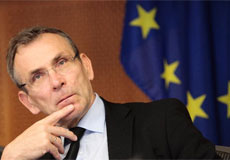Commissioner Piebalgs attending the Informal Council of Foreign affairs (Gymnich) in Cyprus

EU Development Commissioner will attend on 7 and 8 September the informal meeting of EU Ministers of Foreign Affairs in Paphos, Cyprus. High Representative Catherine Ashton will chair the meeting. Such informal meetings, also known as 'Gymnich', give ministers each semester an opportunity to discuss current issues of importance freely and in depth. The crisis in Syria will be top of the agenda on Friday and two key horizontal issues will also be addressed – water issues and education in EU foreign policy.
In light of the dramatic developments unfolding in Syria and following the appointment of Lakhdar Brahimi as new envoy of the United Nations and the League of Arab States, Ministers will exchange views on the situation on the ground and on how to adjust the EU's response. This includes considering how to support Mr Brahimi's endeavours and find a solution to the crisis, including by looking into how the EU can structure its work with the Syrian opposition and contribute to the preparation for a political transition. On 4 September, Catherine Ashton spoke with Lakhdar Brahimi on the immediate priority to reduce violence ![]() . She assured him of the EU's support and underlined her view that "close coordination and united diplomatic action by the international community are pre-requisites" for the success of his mission. The High Representative has called on the members of the UN Security Council and all parties to provide Mr Brahimi with the support he requires.
. She assured him of the EU's support and underlined her view that "close coordination and united diplomatic action by the international community are pre-requisites" for the success of his mission. The High Representative has called on the members of the UN Security Council and all parties to provide Mr Brahimi with the support he requires.
The humanitarian situation in Syria remains a top priority for the EU, which is playing a leading role in response to the UN's call for support, constantly stepping up its humanitarian assistance. The European Commission is preparing to release an additional €50 million in humanitarian funding to help Syrian civilians caught up in their country's crisis. This will bring to €200 million the assistance from the European Commission and Member States - roughly half of all international humanitarian aid in the crisis.
The Gymnich is also an opportunity to discuss external relations in a wider sense and to focus on cross-cutting issues critical to Europe's interests.
Water is likely to become one of the most contested resources in the future given its implications on human well-being, economic development and regional security. This could undermine the stability of states and societies increase the risk of inter-state and regional tensions and could lead to instability and conflict. Addressing these root-causes, particularly climate change and demographic and economic development pressures, are at the heart of the international efforts to deal with the challenge of water.
The EU has been fully behind these efforts. Recently, while marking World Water Week (26-31 August), Development Commissioner Andris Piebalgs confirmed the EU's strong commitment to making sure that everyone, no matter where they live, has access to clean, safe water and sanitation: "Over the period 2004-2009, EU aid has provided access to clean drinking water to more than 32 million people and to sanitation to over 9.5 million people across the world. Access to water and sanitation has been one of top priorities of the EU and over the last decade, our aid has almost tripled to reach around €2 billion over the period 2008-2013."
Another issue critical in conflict-affected countries and those undergoing political transition is education. The lack of education can exacerbate the causes of instability and undermine prospects for developing stability. On the other hand, where there is education, it can help promote more democratic and sustainable transition from war or authoritarianism to peace.
Education is already a priority in the EU's development cooperation: The EU supports education in 46 countries to the amount of €3.9 billion. The EU believes in the balanced development of the whole sector, building on the gains made in primary education in the last decade, and transforming them into further gains in sustainable human and social development and inclusive growth. Ministers will discuss how education could form part of the EU's comprehensive response to crisis situations.















